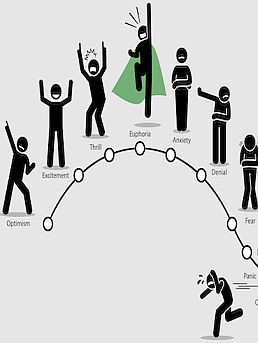 Financial analysts have been aware for quite a long time that excess market volatility is a phenomenon which cannot be rationalized by the principles of fundamental analysis and statistical technical analysis alone. The task to identify what drives stock prices and what drives investors’ decision making is incomplete without the addition of the emerging field of behavioral finance. Behavioral finance is stuck with identifying the forces of market psychology and its effects on the overall sentiment steering market trends and pricing. It deals with psychological factors which influence the nature of human beings, a departure from rational performing factors such as: economic activity, consumption, investment, and interest rates. Human investors are greatly influenced by cognitive and emotional biases, and are subject to the sway of herd instinct. At the core of behavior finance is the development of rigorous models to provide insight into market sentiments for better measurement of future pricing.
Financial analysts have been aware for quite a long time that excess market volatility is a phenomenon which cannot be rationalized by the principles of fundamental analysis and statistical technical analysis alone. The task to identify what drives stock prices and what drives investors’ decision making is incomplete without the addition of the emerging field of behavioral finance. Behavioral finance is stuck with identifying the forces of market psychology and its effects on the overall sentiment steering market trends and pricing. It deals with psychological factors which influence the nature of human beings, a departure from rational performing factors such as: economic activity, consumption, investment, and interest rates. Human investors are greatly influenced by cognitive and emotional biases, and are subject to the sway of herd instinct. At the core of behavior finance is the development of rigorous models to provide insight into market sentiments for better measurement of future pricing.
A 1922 paper titled Overreaction and Diagnostic Expectations in Macroeconomics, by Pedro Bordalo, Nicola Gennaioli, and Andrei Shleifer, is highly cited at the American Economic Association this year. The authors used the Survey of Professional Forecasters and Blue Chip survey data for future four-quarter forecasts with a large set of macroeconomic variables in their research. Their conclusion contrary to rational expectations: individual forecasters overreact most of the time. They started their research after the collapse of Lehman Brothers in September 2008 and the ensuing meltdown of the US financial system. Nicola Gennaioli, and Andrei Shleifer authored a book published by Princeton University Press about it in 2018: “A Crisis of Beliefs: Investor Psychology and Financial Fragility.” The book presents a new theory of belief formation that explains why the financial crisis came as such a shock to so many people―and how financial and economic instability persist.
The authors’ most recent work focused on building upon the new framework for understanding today’s unpredictable financial waters. Their paper Overreaction and Diagnostic Expectations in Macroeconomics, describes the addition of one psychologically well-founded parameter to the rational expectations model to account for overreaction. Future research focuses on refining this model to include a second parameter to account for underreaction.
The importance of such work is groundbreaking. Adding human sentiment to measurements in dynamic Macroeconomic expectations using basic psychological principles, and empirical analysis, will lead to more accurate predictions. This comes at a time when GPU-accelerated data science, is substantially reducing infrastructure costs with superior performance for end-to-end data macroeconomic workflow projects.
On October 9th, the Nobel Prize in Economics, for 2023, will be awarded. There is a very good chance that Andrei Shleifer, Nicola Gennaioli, and Pedro Bordalo will be this year’s Nobel laureates. Historical data shows that demand for the works of the Nobel laureates increases in the weeks immediately following the Swedish Academy’s announcement. Readers are generally interested in the books of a recent Nobel Prize laureate, fueling demand for all types of works published by them. The increase in demand to a relatively static supply, often leads to higher prices at least until more copies are made available when feasible.
Last year, Andre Chevalier accurately predicted that the Nobel Prize in Literature was to be awarded to the French author Annie Ernaux. Her most recent book in English at the time, “Getting Lost”, bearing her signature, was selling around $500, which was a tenfold increase in price prior to the announcement. Andrei Shleifer and Nicola Gennaioli have no recent publications besides various papers published in journals, such as, the Journal of Political Economy and the Journal of Economic Perspectives. Even though the original book A Crisis of Beliefs: Investor Psychology and Financial Fragility does not include the recent research on overreaction measurement, it does present the foundational research that leads to that. There are multiple copies available at bottom level prices, but, that could change on October 9.

{ 0 comments… add one now }